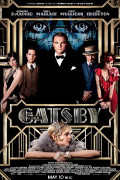
Directed by
Baz Luhrmann
142 minutes
Rated M
Reviewed by
Bernard Hemingway

Great Gatsby, The (2013)
Synopsis: It’s the 1920s and aspiring writer Nick Carraway (Tobey Maguire) finds himself drawn to the lavish lifestyle of his millionaire neighbor, Jay Gatsby (Leonardo DiCaprio) and his attempt to win back the love of his life, Daisy Buchanan (Carey Mulligan).
Baz Luhrmann is a tragic romantic. From his first film Strictly Ballroom (1992) through Romeo + Juliet (1996), Moulin Rouge (2001) and Australia (2008) to his latest film, a much-anticipated adaptation of F. Scott Fitzgerald’s iconic novel, his domain has been love’s twinned glories and agonies, dealt with almost obsessively in ever more grandiose envisionings.
The Great Gatsby, a story of doomed love set in the Roaring Twenties between the devastation of WWI and the sobering downturn of The Great Depression, provides Luhrmann with a tailor-made opportunity to once again exercise his proclivities and with the help of his long-time script collaborator, Craig Pearce, he brings it off handsomely in a feast of larger-than-life visuals and effusive emotion. That the film has been so consistently disparaged by critics both here and in the US is perhaps occasioned more by sour grapes at his populist tendencies and the apparent hubris of his theatricalizing vision rather than the actual shortcomings of the film itself. The Great Gatsby has been widely represented as an overheated serving of lavish production design, CGI icing, and post-modern musical mash-up (which it is) but it is much more than that (although why anyone thought that we needed a 3D version has me beat).
Luhrmann’s film owes much to Jack Clayton’s 1974 version with Robert Redford and Mia Farrow, so much so that it can only be called a remake (as Clayton's version was a remake of the 1949 version with Alan Ladd as Gatsby). Fitzgerald’s text was well-served by Francis Ford Coppola’s script for the Clayton version and there are no major alterations to it by Pearce. Although there a couple of small embellishments such as the completely invented sanitorium framing device from which a now-alcoholic Nick recounts his story (to a portly psychiatrist played by Jack Thompson sporting an unconvincing American accent) and a visualisation of Gatsby’s back story, structurally and formally the two films are very similar. Most of the key scenes and dialogue are reproduced note for note and except for Douglas Slocombe’s high register, perspiration-inducing cinematography, which is replaced by Simon Duggan’s darker tonalities, the two films look much alike. What differences there are very much reflect Luhrmann’s romantic sensibility.
Luhrmann contains his signature penchant for visual pyrotechnics largely to the film’s first act which takes its time introducing us to the mysterious Gatsby via Tobey Maguire’s voice-over. During this section Luhrmann serves up a marvellous feast of set design, costuming and art direction, depicting the lavish but shallow world into which the wide-eyed Nick Carraway has stumbled. Once Gatsby is introduced however the film settles more on him, his obsessive love and the gradual unravelling of his dream, with Luhrmann and Pearce dramatizing the pathos of Gatsby’s high-strung idealism as it is ineluctably ground down by a cruelly indifferent and stupidly venal world. It is here that the main tonal difference between the two films is evident
Compared to Redford’s urbanely cool screen idol of the 1974 version DiCaprio (who, of course was Luhrmann’s star-crossed Romeo in Romeo + Juliet, 1996) is an overwrought lover, tormented by his mad attempt to recreate a vanished past, variously pacing in the rain like a callow youth (DiCaprio looks a good deal younger than Redford despite being slightly older) and at times buckling under the pressures of his ambitions, most pointedly in the climactic confrontation between Gatsby and Tom in the New York hotel room. Nowhere does Luhrmann make his point of difference from the classical Hollywood tradition of masculine insularity (“Frankly dear, I don’t give a damn”) and his love of the more emotive, even histrionic, world of romantic theatre so clear.
Daisy remains a blank canvas for Gatsby’s ardent brush, contributing nothing to the advance of the story (Mulligan has wisely not reproduced Mia Farrow’s shrill mannerisms but her part remains frustratingly underwritten) and Joel Edgerton’s Tom Buchanan is once again a blustering sports jock and philanderer. Rounding out the trio of leads, the perennially young Tobey Maguire is well-chosen as the close-at-hand observer. Australian newcomer Elizabeth Debicki acquits herself well as Daisy’s best friend, Jordan Baker, and local audiences will also have fun spotting a raft of veteran Australian actors including Barry Otto, Steve Bisley, Vince Colosimo and Max Cullen floating through the production.
Don’t succumb to the tall poppy syndrome. Baz Luhrmann is one of our finest film directors, artistically distinctive and consistently inventive albeit shamefully under-rated in his own land.
FYI: Luhrmann's film would make nice double bill technically, tonally and thematically with Scorsese's Gangs of New York (2002) which, conveniently, also starred DiCaprio.

Want more about this film?


Want something different?




